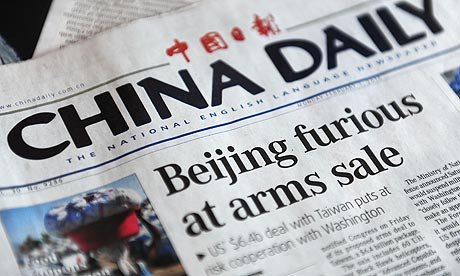Why are China’s English language newspapers an absolute joke?

Image Source: atlantablackstar.com
Those of us who lived in China for quite a long time may remember the days when people actually bothered to read the English language newspapers offered in China. This often relates to our own personal sets of circumstances; we had probably just arrived in the country and were mainly staying in internationally branded luxury hotels, probably couldn’t read Chinese characters at all, internet speeds were a lot slower and we needed something that was actually China specific, rather than an imported foreign newspaper that had arrived a day or two after printing. Therefore, we’d happily settle for a copy of the China Daily or Global Times.
Nowadays, we don’t really bother with those kinds of newspapers as we have a huge range of information available at our fingertips; many of us choose to read international newspapers on our smartphones and rely upon a select few official WeChat pages that we follow for China related content. The newspapers are still printed, can still be found, but they aren’t quite as popular as they used to be. Here’s why:
They are thin on content:
Being publications that were originally intended for a select small audience of travelling foreigners to read; therefore there was little effort made to ensure that they were filled to the brim with content and they wouldn’t ever offer such a lengthy read that one could read on a Sunday morning with a cup of coffee. When a foreign newspaper can offer you a lot more content on the screen of your phone via their app or website; why would one even bother reading such a small newspaper?
Foreign readers are no longer the true target audience:
It is rumoured that most foreign residents in China stopped reading the China Daily years ago, but their work was still in demand from Chinese people that used their publications for the purpose of English language self-study. Accepting this reality, some may feel that content may have been overly simplified to an extent; this is reflected especially well on the websites where most comments appear to come from Chinese readers rather than foreigners.
Beijing/Shanghai centric:
The newspapers may feature information that is relevant to a local area such as restaurant reviews or event listings. However, there is usually a tendency to solely feature information relating to Beijing and Shanghai; those living and work elsewhere may feel that the information provided is not relevant to them. English language newspapers with a focus upon other cities tend to be rather rare due to a relative lack of a market for them.
Blatant propaganda:
While political bias in the media is not considered to be a secret anywhere in the world; China’s English language newspapers are forced to follow the party line and will be cautious of printing any stories that are critical of the work carried by the leadership in any way. Although this is completely understandable, the inability to challenge the status quo may make the general reading experience feel rather monotonous and boring. The censorship was always all too evident and readers may feel that they are not quite getting the whole story; especially Western readers that are in the habit of subconciously analysing anything that they read and not taking it at face value.
Limited distribution:
Unlike Chinese language newspapers which can be found at many a street stall; English language newspapers are usually often found in certain international hotels or larger Western restaurants. Most potential readers are not likely to make a great effort to find a copy; most will only ever read the English language newspapers when offered one on a plane by the cabin crew; quite possibly the only place in China where one still can’t browse the web. This reminds us that English language newspapers do still exist in China, but they are merely a novelty that most of us can now make do without.